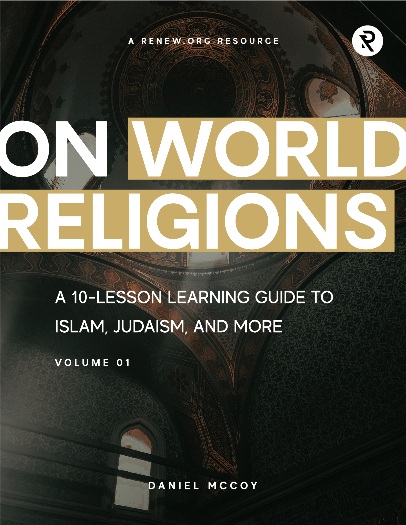
What Is Judaism? The Basics of Judaism in 10 Questions, 10 Definitions, and 10 Quotes
What are the basics of Judaism? Judaism is the religion of the Jews, with both “Jew” and “Judaism” derived from the name of one of Jacob’s sons, Judah. Judaism’s beliefs and practices are based in the Hebrew Scriptures (what Christians commonly call the “Old Testament”), as well as the teachings of Jewish rabbis throughout history. Contemporary Judaism includes a Reform branch which puts emphasis on ethical practice over traditional beliefs.
If you want to learn the basics of Judaism, a good start is with the following 10 questions, 10 definitions, and 10 quotes.
The Basics of Judaism: 10 Questions
- What father of twelve sons did God name “Israel”? Jacob
- At what location did God give His laws to the Jewish nation after delivering them from slavery in Egypt? Mount Sinai
- What seismic change happened to the nation during the reign of King Solomon’s son, King Rehoboam? The kingdom divided into North and South.
- What foreign empire invaded Jerusalem, destroyed the Jewish temple, and deported many of the Jewish people to Babylon? Chaldean/Babylonian
- What foreign empire allowed the Jewish people to return and rebuild their homeland? Persian
- What Jewish family liberated their Jewish homeland from the occupying Seleucids from Syria, an event celebrated at Hannukah? Maccabees/Hasmoneans
- After the Roman Empire destroyed the second temple and decimated their homeland, the Jewish people made their settlements outside the Promised Land and were led by what type of leader who applied the law of Moses to all areas of life? Rabbis
- Although there are orthodox Jews (e.g., Hasidic), there are also Jews who no longer bind themselves to traditional rabbinic Judaism. What is this more “enlightened” form of Judaism known as? Reform Judaism
- How many Jewish people were killed in the Holocaust which sprang from the German Third Reich’s “final solution” to annihilate the Jews? Six million
- What nation was founded in 1948 in order to give the remaining Jewish people a homeland after the Holocaust? Israel
The Basics of Judaism: 10 Definitions
- Ashkenazic – Jews who traditionally lived in regions of France, Germany, and Eastern Europe
- Sephardic – Jews who traditionally lived in the Iberian Peninsula (Spain and Portugal)
- Torah – The law of Moses, also known as the Pentateuch, which includes the first five books of the Hebrew Bible; the word can also refer to the whole Hebrew Bible
- Talmud – A massive collection of Jewish law and literature which includes the Mishnah (rabbinic teachings on the Hebrew Bible) and the Gemara (rabbinic commentary on the Mishnah)
- Halakah – Another term for Jewish law; means “to go” or “to walk”
- Mitzvot – Another term for a Jewish commandment; there are said to be 613 in the law of Moses
- Sabbath – The weekly day of rest to be remembered and enjoyed; also known as “Shabbat”
- Rosh Hashanah – The Jewish “New Year,” which starts a 10-day period of penitence which ends with Yom Kippur, the “Day of Atonement”
- Sukkot – An 8-day festival in which people live in temporary shelters to remember the Hebrews’ wilderness wanderings under Moses
- Bar Mitzvah – The ceremony when a young man reaches the age of 13 and becomes a “son of the commandments”
The Basics of Judaism: 10 Quotes
Torah (The Law)
And God spoke all these words: “I am the Lord your God, who brought you out of Egypt, out of the land of slavery. You shall have no other gods before me.”
– Exodus 20:1-3, NIV
“Hear, O Israel: The Lord our God, the Lord is one. Love the Lord your God with all your heart and with all your soul and with all your strength.”
– Deuteronomy 6:4-5, NIV
“Hear, O Israel: The Lord our God, the Lord is one.”
Nevi’im (The Prophets)
“He has shown you, O mortal, what is good. And what does the Lord require of you? To act justly and to love mercy and to walk humbly with your God.”
– Micah 6:8, NIV
Kethuvim (The Writings)
“The proverbs of Solomon son of David, king of Israel: for gaining wisdom and instruction; for understanding words of insight; for receiving instruction in prudent behavior, doing what is right and just and fair.”
– Proverbs 1:1-3, NIV
Jewish Rabbis
“What is hateful to you, do not do you to your fellow: this is the whole Torah; the rest is the explanation.”
– Rabbi Hillel the Elder, in response to the challenge to explain the whole Torah while standing on one foot
“What is hateful to you, do not do you to your fellow: this is the whole Torah; the rest is the explanation.”
“All these tracts are entirely devoted to precepts pertaining to the observance of the festivals and Sabbath, such as the performance of the different ritual ceremonies on feast-days, the manner of sanctifying the Sabbath.”
– Introduction to Tract Sabbath, of the Babylonian Talmud (translated by Michael L. Rodkinson)
Jewish Philosophers
“For some men, admiring the world itself rather than the Creator of the world, have represented it as existing without any maker, and eternal….But Moses, who had early reached the very summits of philosophy…and who had learnt from the oracles of God the most numerous and important of the principles of nature, was well aware that it is indispensable that in all existing things there must be an active cause.”
– Philo of Alexandria, from “On the Creation”
“Belief in the existence of the Creator, who is perfect in every manner of existence and is the Primary Cause of all that exists.”
– Rabbi Moshe ben Maimon “Maimonides,” from the Thirteen Principles of Jewish Faith)
Reform Judaism
“We recognize in every religion an attempt to grasp the Infinite, and in every mode, source or book of revelation held sacred in any religious system the consciousness of the indwelling of God in man. We hold that Judaism presents the highest conception of the God-idea as taught in our Holy Scriptures and developed and spiritualized by the Jewish teachers, in accordance with the moral and philosophical progress of their respective ages.”
– “Declaration of Principles,” 1885 Pittsburgh Platform of the American Reform Movement in Judaism
“Judaism presents the highest conception of the God-idea…in accordance with the moral and philosophical progress of their respective ages.”
“We reassert the doctrine of Judaism that the soul is immortal, grounding the belief on the divine nature of human spirit, which forever finds bliss in righteousness and misery in wickedness. We reject as ideas not rooted in Judaism, the beliefs both in bodily resurrection and in Gehenna and Eden (Hell and Paradise) as abodes for everlasting punishment and reward.”
– “Declaration of Principles,” 1885 Pittsburgh Platform of the American Reform Movement in Judaism
2 Questions about Judaism for Christians to Consider
- What do you think is the biggest tragedy the Jewish people have faced throughout their history?
- What is something that Christianity inherits from Judaism which you are thankful for?








